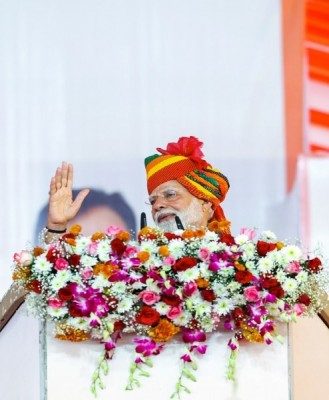
Swachh Bharat is a revolution playing out in real time: Kovind
New Delhi, Sept 29 (IBNS): President Ram Nath Kovind inaugurated the Mahatma Gandhi International Sanitation Convention in New Delhi on Saturday.
Speaking on the occasion, the President said that achieving universal access to adequate and equitable sanitation and hygiene by 2030 is a major challenge in many parts of the world. Drinking water, sanitation, and hygiene are central to Sustainable Development Goal 6, especially targets 6.1, 6.2 and 6.3. Target 6.2 of the Sustainable Development Goals calls for countries to end open defecation, ensure everyone has access to a basic toilet and put in place systems for safe management of excreta.
The President said that improving access to sanitation and eradicating open defecation have enormous implications.
They are critical social and economic investments. The absence of a suitable toilet and appropriate hygiene and sanitation practices can lead to malnutrition and life-long disadvantages. Therefore, for us in India – as elsewhere – a mission such as Swachh Bharat is critical to securing our human capital and our demographic dividend – and to giving our children a better future. No young girl should have to give up school only because a girls’ toilet is not available. Such an occurrence would be a scar on our collective conscience.
The President said that Swachh Bharat is a revolution playing out in real time. As an instrument of mass mobilisation, as a people’s movement, and as a national goal towards which there is near total commitment, Swachh Bharat represents the spirit of our Independence movement. India is striving to eliminate open defecation in its entirety by October 2, 2019. This is the best 150th birthday gift we can give Gandhiji.
The President said that the Swachh Bharat Mission has been shaped by among the world’s leading specialists on sanitation. It has been scripted by common Indians of uncommon quality – men and women of rare courage, of foresight, social empathy and civic pride. Individually and collectively, they have worked to free their neighbourhoods, their villages and their towns and cities from open defecation. Inch by inch, day by day, person by person, family by family, they have persuaded fellow citizens to adopt behaviour change. Our sanitation champions come from all regions of the country, all sections of society, all communities and all social and economic groups.
Addressing Ministers and delegates from 68 participating countries, the President said that our successes with Swachh Bharat, our attainments in the sphere of sanitation, our methods and our mechanisms, are available to all of them to use as they deem necessary. Access to improved sanitation is not a target and a goal for one country or the other – it is the interlinked destiny of humankind.
The President suggested five important themes that countries may choose to adopt while meeting the problem of insufficient sanitation. These are - ensure people lead the planning, implementation and management of sanitation programmes; use smart and affordable technologies for effective and efficient service delivery; eliminate all forms of inequalities in service delivery; create innovative financing instruments to fund and sustain the sanitation movement; and develop capacities within the government to plan, implement and monitor sanitation programmes.
The Mahatma Gandhi International Sanitation Convention is being organised by the Ministry of Drinking Water and Sanitation to mark the beginning of the 150th birth anniversary celebrations of Mahatma Gandhi, also coinciding with the fourth anniversary of the launch of Swachh Bharat Mission.
Support Our Journalism
We cannot do without you.. your contribution supports unbiased journalism
IBNS is not driven by any ism- not wokeism, not racism, not skewed secularism, not hyper right-wing or left liberal ideals, nor by any hardline religious beliefs or hyper nationalism. We want to serve you good old objective news, as they are. We do not judge or preach. We let people decide for themselves. We only try to present factual and well-sourced news.







